
This course, together with the experience gained, will provide site staff a clear understanding of how health and safety affects their role and practical steps to take to ensure safe practice on a construction site.
This programme is designed for all construction operative staff who require an understanding of health and safety regulations relating to construction activities. This course may be used as training prior to CPCS assessments and attendance of the CITB health and safety touch-screen test.
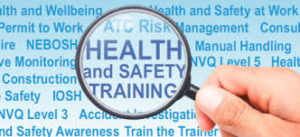
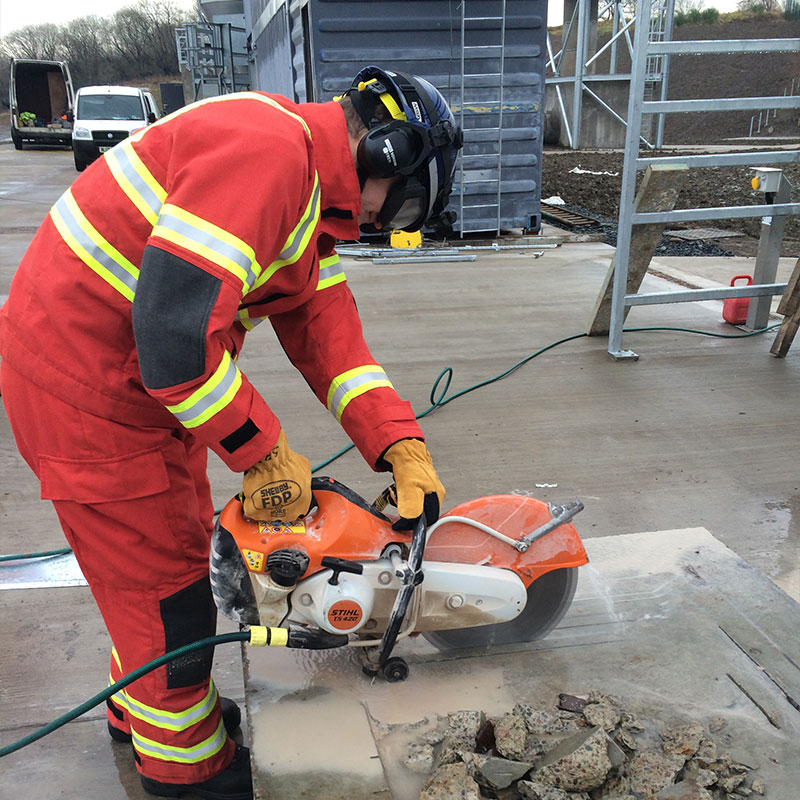

Course Aim
The aim of the Abrasive Wheels training course is to provide candidates with the basic knowledge and practical skills involved in the safe mounting and selection of Abrasive Wheels and Cutting Discs to the official NPORS (National Plant Operators Registration Scheme) Standard.
Objectives:
On successful completion of the Abrasive Wheels training course, the candidate will be able to:
- Select and mount safely the correct type of disc or wheel for the task to be carried out.
- Fully understand their relevant plant equipment and abrasive wheels duties and responsibilities under the Health and Safety at Work Act 1974.
Abrasive Wheels Training Course Content:
- The Health and Safety at Work Act 1974
- Construction (Health, Safety and Welfare) Regulations 1996
- COSSH Regulations 2002
- PPE Regulations1992
- PUWER 1998
- Safety in the use of Abrasive Wheels HS(G)17
- Manual Handling Regulations 1992
- Types and functions of abrasive wheel equipment and cutting discs
- The selection, testing, mounting and storage of abrasive wheels and cutting off discs
- The care, maintenance, transport and handling of abrasive wheels and cutting off discs

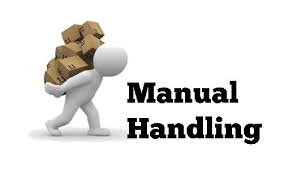
Manual Handling of Inanimate Objects ensures that delegates hold an understanding of safe techniques to use when lifting and moving objects of varying size and weight, so as to avoid any injury to themselves or others. The training is designed for those who undertake manual handling activities in their working role and it can be customised so that delegates can experience handling objects which they would encounter in their workplace.

Content:
• Course introduction
• Why correct technique is important
• Manual handling hazards and risks
• Preventing injury from manual handling
• Remaining compliant
• Importance of risk assessment
• Applying risk assessment to manual handling


The Level 3 NVQ Diploma in Occupational Work Supervision qualification has been developed for delivery in a working environment; this means you need to be employed to study this qualification. It has been designed to develop and recognise your skills, knowledge and competence so that you can work in Occupational Work Supervision within the construction industry or progress onto further learning.
The learner will learn key practical skills and knowledge in these mandatory units
– Confirming Work Activities and Resources for an Occupational Work Area in the Workplace
– Developing and Maintaining Good Occupational Working Relationships in the Workplace
– Confirming the Occupational Method of Work in the Workplace
– Implementing and Maintaining Health, Safety and Welfare in the Workplace
– Co-ordinating and Organising Work Operations in the Workplace
The learner will also learn key practical skills and knowledge in two of the following optional units:
– Allocating and Monitoring the Use of Plant, Machinery or Equipment in the Workplace
– Monitoring Progress of Work Against Schedules in the Workplace
– Confirming Work Meets Quality Standards in the Workplace
– Implementing Procedures to Support the Team’s Performance in the Workplace
– Co-ordinating and Confirming Dimensional Control Requirements of the Work in the Workplace
– Contributing to the Circulation of Construction Related Project Information in the Workplace
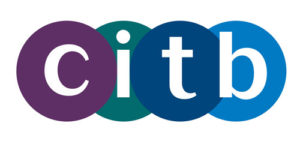
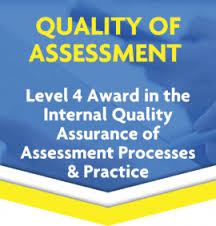
These qualifications are suitable for anyone who is working in, or looking to gain entry to roles in Internal Quality Assurance. The units will give you the opportunity to develop and improve practice as well as achieving a professional qualification.
Candidates who wish to partake in the IQA awards must:
– Work in a training/assessing and quality-checking environment.
– Hold an assessor award (TAQA/A1/D32/D33 CAVA).
– Hold a relevant qualification to the specific subject that they wish to IV.
The qualification consists of two units:
Unit 1 – Level 4 Award in Understanding the Internal Quality Assurance of Assessment Process and Practice.
This unit relates to the theory of quality assurance. It covers topics such as the purpose of Internal Quality Assurance (IQA), IQA planning and how to undertake an IQA activity. Candidates are required to submit assignments as per hand in dates. Assessment is in the form of a written portfolio. Ongoing tutor support is available.
Unit 2 – Level 4 Award in the Internal Quality Assurance of the Assessment Process and Practice.
This is mostly a practical unit consisting of undertaking IQA activities in your area of practice while being observed by the tutor. There is an element of written work to produce documentation required for IQA. This unit follows on from Unit 1. Assessment is by direct observation and submission of the portfolio. Ongoing tutor support is available.
Workplace observation required


These qualifications are suitable for anyone who is working in, or looking to gain entry to roles in Internal Quality Assurance. The units will give you the opportunity to develop and improve practice as well as achieving a professional qualification.
Candidates who wish to partake in the IQA awards must:
– Work in a training/assessing and quality-checking environment.
– Hold an assessor award (TAQA/A1/D32/D33 CAVA).
– Hold a relevant qualification to the specific subject that they wish to IV.
The qualification consists of two units:
Unit 1 – Level 4 Award in Understanding the Internal Quality Assurance of Assessment Process and Practice.
This unit relates to the theory of quality assurance. It covers topics such as the purpose of Internal Quality Assurance (IQA), IQA planning and how to undertake an IQA activity. Candidates are required to submit assignments as per hand in dates. Assessment is in the form of a written portfolio. Ongoing tutor support is available.
Unit 2 – Level 4 Award in the Internal Quality Assurance of the Assessment Process and Practice.
This is mostly a practical unit consisting of undertaking IQA activities in your area of practice while being observed by the tutor. There is an element of written work to produce documentation required for IQA. This unit follows on from Unit 1. Assessment is by direct observation and submission of the portfolio. Ongoing tutor support is available.
Workplace observation required

The Level 3 Award: Assessing Vocationally Related Achievement (L3 AAVRA) is for practitioners who assess knowledge and/or skills in vocationally-related subject areas who use the following assessment methods: assessments in simulated environments, skills tests, oral and written questions, assignments, projects, case studies and RPL. This may take place in training workshops, classrooms or other learning environments. It has been designed:
- For individuals who are not in an assessor’s role, or who have just started their journey as an assessor in the further education and skills sector / private sector
- For individuals who are interested in knowing more about assessment or who need to know about assessment practice as part of their role
- For individuals who want a short qualification to enable them to make career choices
- For individuals who are not currently practicing e.g. a starting point for aspiring assessors or a professional development qualification for managers, HR or quality assurance personnel
- For individuals who are carrying out assessments and quality assurance in most learning environments including FE, Adult Continuing Learning, Employers and Third Sector
- For individuals who are carrying out quality assurance in all occupational sectors
- For individuals working in accredited learning OR non accredited learning (where people may assess performance but do not assess for a qualification); the NQF and the QCF
- For individuals who have already achieved some Education & Training or Learning & Development units that can be carried forward into this qualification
- For individuals who have completed some introduction to training qualifications
Level 3 learning would include:
- A planned approach to reading and research relating to principles, theories and practice
- Evidence of a reflective approach
- Reflection on own practice grounded upon reading
- Consideration of how professional values impact on working in your area
On successful completion of the course, you would:
- Understand the principles & requirements of assessment
- Understand different types of assessment methods
- Understand how to plan assessment
- Understand how to involve learners and others in assessment
- Understand how to make assessment decisions
- Understand own contribution to the quality assurance of assessment
- Understand how to manage information relating to assessment of occupational competence
- Understand the legal and good practice requirements in relation to assessment
- Be able to prepare assessments of vocational skills, knowledge and understanding
- Be able to carry out assessments of vocational skills, knowledge and understanding
- Be able to provide required information following the assessment of vocational skills, knowledge and understanding
- Be able to maintain legal and good practice requirements when assessing vocational skills, knowledge and understanding

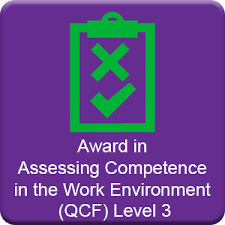
The Level 3 Award in Assessing Competence in the Work Environment (QCF) is for practitioners who assess the demonstration of competence in a work environment using the following assessment methods: observation, examining work products, oral questioning and discussion, use of others (e.g. witnesses), learner statements and Recognition of Prior Learning (RPL).
he L3 AUPPA is intended for those who wish to gain an understanding of the principles and practices of assessment without any requirement to practice as assessors. It is a knowledge-only award. It has been designed:
- For individuals who are not in an assessor’s role, or who have just started their journey as an assessor in the further education and skills sector / private sector
- For individuals who are interested in knowing more about assessment or who need to know about assessment practice as part of their role
- For individuals who want a short qualification to enable them to make career choices
- For individuals who are not currently practicing e.g. a starting point for aspiring assessors or a professional development qualification for managers, HR or quality assurance personnel
- For individuals who are carrying out assessments and quality assurance in most learning environments including FE, Adult Continuing Learning, Employers and Third Sector
- For individuals who are carrying out quality assurance in all occupational sectors
- For individuals working in accredited learning OR non accredited learning (where people may assess performance but do not assess for a qualification); the NQF and the QCF
- For individuals who have already achieved some Education & Training or Learning & Development units that can be carried forward into this qualification
- For individuals who have completed some introduction to training qualifications
Level 3 learning would include:
- A planned approach to reading and research relating to principles, theories and practice
- Evidence of a reflective approach
- Reflection on own practice grounded upon reading
- Consideration of how professional values impact on working in your area
On successful completion of the course, you would:
- Understand the principles & requirements of assessment
- Understand different types of assessment methods
- Understand how to plan assessment
- Understand how to involve learners and others in assessment
- Understand how to make assessment decisions
- Understand own contribution to the quality assurance of assessment
- Understand how to manage information relating to assessment of occupational competence
- Understand the legal and good practice requirements in relation to assessment
- Be able to plan the assessment of occupational competence
- Be able to make assessment decisions about occupational competence
- Be able to provide required information following the assessment of occupational competence
- Be able to maintain legal and good practice requirements when assessing occupational competence





















